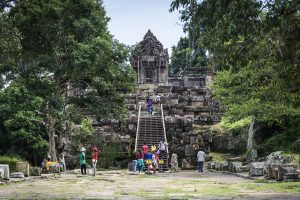Sporadically fought between 2008 and 2011, the Little War – as it is sometimes known – had an enormous impact on Cambodia-Thailand relations that still rankles to this day. Even now, the border crossing at the foot of the temple’s steps remains closed and the 11th century ruins are off limits from the Thai side.
The area was once a lucrative business zone. Thai tourist operators boasted a perfectly sealed highway all the way to the border and the temple’s footsteps, and dodgy tour guides in Bangkok would even erroneously claim there was no access at all from the Cambodian side.
The only way up, they said, was through their border gate at Pha Mor E Daeng.
Thousands of tourists would climb the steps each day from Thailand with visa free access, a cash cow for those at the gate. Now, many in the new government in Bangkok want that access back and to let bygones be bygones.
Seven lawmakers from Thailand’s northeast have petitioned Prime Minister Srettha Thavisin, urging him to open talks with the Cambodian government regarding visa-free travel to Preah Vihear temple for Thais from the Thai side of the border.
According to Thai Defense Minister Sutin Klungsang, the petition was received during a recent trip to Pha Mor E Daeng, where the fence around the temple has remained shut for 15 years.
He also said a discussion with the defense committee was slated for early next year and he told the Bangkok Post that any decision would be purely based on the expected benefits for the armed forces as a whole.
That reasoning is at odds with the MPs, whose petition is based on the prospective tourist receipts from visa-free access for Thais and perhaps foreigners who, as always, would be required to pay any additional charges, including for a special visa to enter Cambodian territory.
Tourism in both countries is still recovering from the COVID-19 pandemic but the Cambodians hold the moral high ground on this and have nothing to lose by ignoring the request.
There’s little financial gain on offer for Phnom Penh and the Cambodian government can be forgiven for still carrying a grudge over a conflict that did not have to happen and officially left 34 soldiers dead on both sides, quite a few civilians wounded, and many more displaced.
The Little War began when Thai troops crossed the border and seized control of the temple, which sits atop the Dangrek Mountains, and with that the military high ground, which the senior brass in Bangkok had coveted ever since the current boundaries were signed off by French colonialists in 1904.
There was no justification for what the Thais did and the Little War was, at times, vicious. As journalist Hurley Scroggins would subsequently report, the Thai military had deployed cluster bombs – a favorite for children who unwittingly pick up what they think are toys.
It ended with a ruling by the International Court of Justice in Cambodia’s favor, a reassertion of previous decisions, and a sweet victory given this country’s litany of tragedies and the repeated put-downs that Khmers had to endure from Thais through decades of civil war as the region’s basket case.
The conflict was one of the few examples in this country’s recent history when the diplomatic community and the press corps – which was much larger than it is today – were sympathetic to Phnom Penh’s view and wholeheartedly backed then-Foreign Minister Hor Namhong.
Cambodia’s control of the temples has been sanctioned by international law, a decision the Thais have had difficulty in accepting, they control the high ground around Preah Vihear, and any decision to reopen the gates at Pha Mor E Daeng is theirs to make.

































